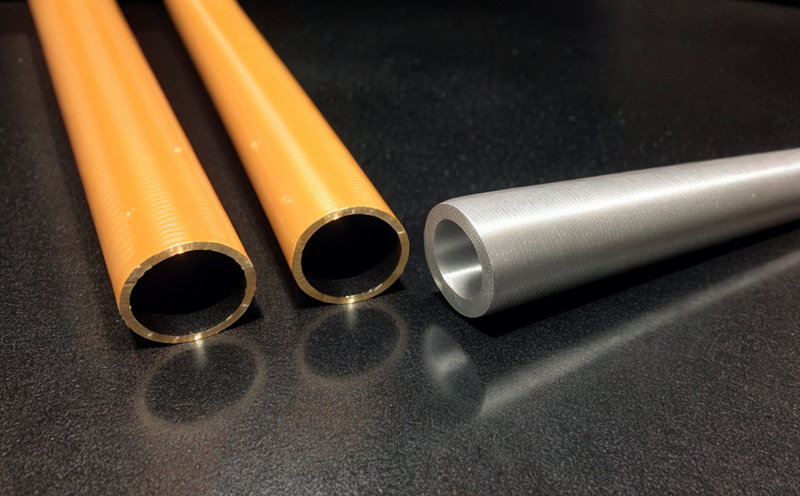ASTM D2344 Short Beam Shear Testing of Laminates
The ASTM D2344 short beam shear test is a critical procedure used to evaluate the shear strength properties of composite materials, particularly laminates. This test provides valuable insights into the mechanical integrity and performance of these materials under shear loading conditions.
In aerospace and aviation applications, where structural components must withstand high stresses without failure, ASTM D2344 is an indispensable tool for material selection and quality assurance. The procedure involves preparing a standard specimen that replicates the laminate structure to be tested. Specimens are then subjected to controlled shear forces until fracture occurs.
The test results are essential for ensuring that materials meet stringent industry standards, such as those outlined in ASTM D2344 itself and other relevant aerospace specifications like AS 5129. These tests help prevent catastrophic failures in critical components, thereby enhancing safety and reliability.
Understanding the shear behavior of laminates is crucial for predicting how materials will perform under real-world conditions. This knowledge allows engineers to optimize material composition and design to meet performance requirements while minimizing weight and cost. For instance, aerospace manufacturers use this information to select the most suitable composite materials for specific applications.
The ASTM D2344 test is typically performed using a universal testing machine equipped with a short beam fixture. The specimen, cut from the laminate under consideration, is clamped into position and subjected to progressively increasing shear forces until it fails. Careful attention must be paid during sample preparation to ensure that the geometry of the specimen accurately represents the actual laminate structure.
The test procedure specifies precise dimensions for the specimens, ensuring consistency across different laboratories. This standardization allows for reliable comparisons between results obtained in various facilities. Properly conducted tests yield data that can guide decisions about material selection and process improvements.
Engineers rely on ASTM D2344 short beam shear testing to validate new composite materials before they enter production. By identifying potential weaknesses early in the development cycle, manufacturers can address issues proactively rather than dealing with costly failures later. This approach not only improves product quality but also reduces time-to-market for innovative solutions.
Furthermore, compliance with ASTM D2344 ensures that suppliers meet regulatory requirements set forth by governing bodies like the FAA and EASA. This certification adds credibility to manufacturers' offerings, enhancing customer confidence in their products.
Industry Applications
The aerospace and aviation industries place a premium on lightweight yet strong materials capable of withstanding extreme conditions during flight. Composites like carbon fiber reinforced polymers (CFRP) play a vital role in meeting these demands due to their superior strength-to-weight ratios compared to traditional metals.
ASTM D2344 short beam shear testing supports the development and certification of such advanced composite materials by providing quantitative measures of their mechanical properties. This information is crucial for designing aircraft structures that are both efficient and safe.
Beyond material evaluation, this test can also be employed to assess adhesion between different layers within a laminate structure. Poor bonding between plies can lead to delamination—a common failure mode in composite components. By identifying areas where improvements are needed, manufacturers can enhance the overall durability of their products.
Additionally, aerospace engineers use ASTM D2344 data to evaluate repair techniques for damaged structures. Understanding how various repairs affect shear strength helps ensure that repaired parts maintain integrity and safety standards.
Why Choose This Test
The ASTM D2344 short beam shear test offers several advantages over other methods when evaluating composite materials:
- Standardization: The procedure follows strict guidelines from ASTM, ensuring consistent results across different laboratories.
- Reproducibility: With well-defined specimen preparation and testing protocols, researchers can repeat experiments with confidence in the reliability of their findings.
- Predictive Value: Results provide valuable predictive information about how materials will perform under shear loading conditions, aiding informed decision-making during design stages.
- Compliance: Meeting ASTM D2344 requirements demonstrates adherence to industry best practices and regulatory standards.
Quality and Reliability Assurance
The ASTM D2344 short beam shear test plays a pivotal role in quality assurance processes within the aerospace industry. By ensuring that materials meet specified strength criteria, this procedure helps prevent failures in critical components.
During development phases, engineers use ASTM D2344 results to fine-tune material compositions and manufacturing processes. This iterative process ensures that final products not only satisfy current standards but also anticipate future challenges.
In production environments, regular compliance testing with ASTM D2344 helps maintain consistent quality levels. Any deviations from expected values can prompt investigations into potential issues such as manufacturing defects or raw material variability.
Furthermore, the test contributes to long-term reliability by simulating real-world stress conditions experienced during flight cycles. Engineers can use this data to design structures that are robust enough to endure repeated loading without failure.





